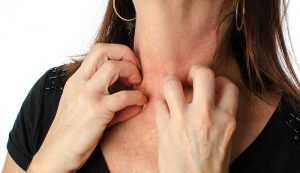Understanding the circadian rhythm of skin and skin disorders may allow people to better treat common dermatological issues.
Tens of millions of people suffer from unsightly, itchy and painful skin disorders such as eczema and psoriasis. While there are many medical treatments that can help alleviate symptoms, these are not a cure. Even worse, there are many people for whom the standard medications either do not work or cause a variety of unwanted side effects. However, new research in chronobiology suggests that timing may be a very important part of managing dermatological disease.
Eczema and Psoriasis: Common Diseases With No Cure
Eczema is one of the most common skin disorders, affecting over 30 million people. Sufferers of this disease develop dry, itchy patches of skin that can crack and bleed. Psoriasis is similar, although not as common. People with psoriasis have an overactive immune system that causes inflammation and a resulting overproduction of skin cells. This overproduction of cells leads to painful and itchy plaques made from a build up of inflamed skin cells.
Both eczema and psoriasis have been shown in research to have distinctive night-day cycles. Taking medications at the times in these cycles when they are most likely to be effective may allow for more effective treatment. But when is the best time to use skin medication?
The Circadian Rhythm of Skin

A new study may have identified the genes that cause this discomfort. Genes such as the CLOCK and PER2 genes, which are intricately involved in regulating and maintaining the circadian rhythm, appear to also be part of the cause of many common skin maladies. Mice who have mutations in the CLOCK gene have a lower severity of skin diseases like psoriasis. Their skin does not react as strongly to the autoimmune activity that normally causes psoriasis flares. Mice who had a mutation in the PER2 gene, on the other hand, developed psoriasis even when they lacked other autoimmune symptoms usually associated with the skin disorder.
Could Chronotherapy Offer Relief from Skin Disorders?
The symptoms of skin diseases such as eczema and psoriasis appear to be intricately linked with the circadian rhythm. Previous studies have found that topical medications are better absorbed in the evening, so this is an ideal time to use them. In addition, taking medications for night-dominant disorders before bedtime may alleviate some of the more severe symptoms seen at night. Last, stopping damage to cells at the time when it is most likely to occur will likely reduce symptoms even during the day.
Chronotherapy may allow many people suffering from these and other skin diseases to get the healthy skin and good night of sleep that they need. However, this is not the only area where study of the circadian rhythm can allow us to achieve better health. Understanding the circadian rhythm of different parts of our bodies is often the first step to developing more effective treatments.







